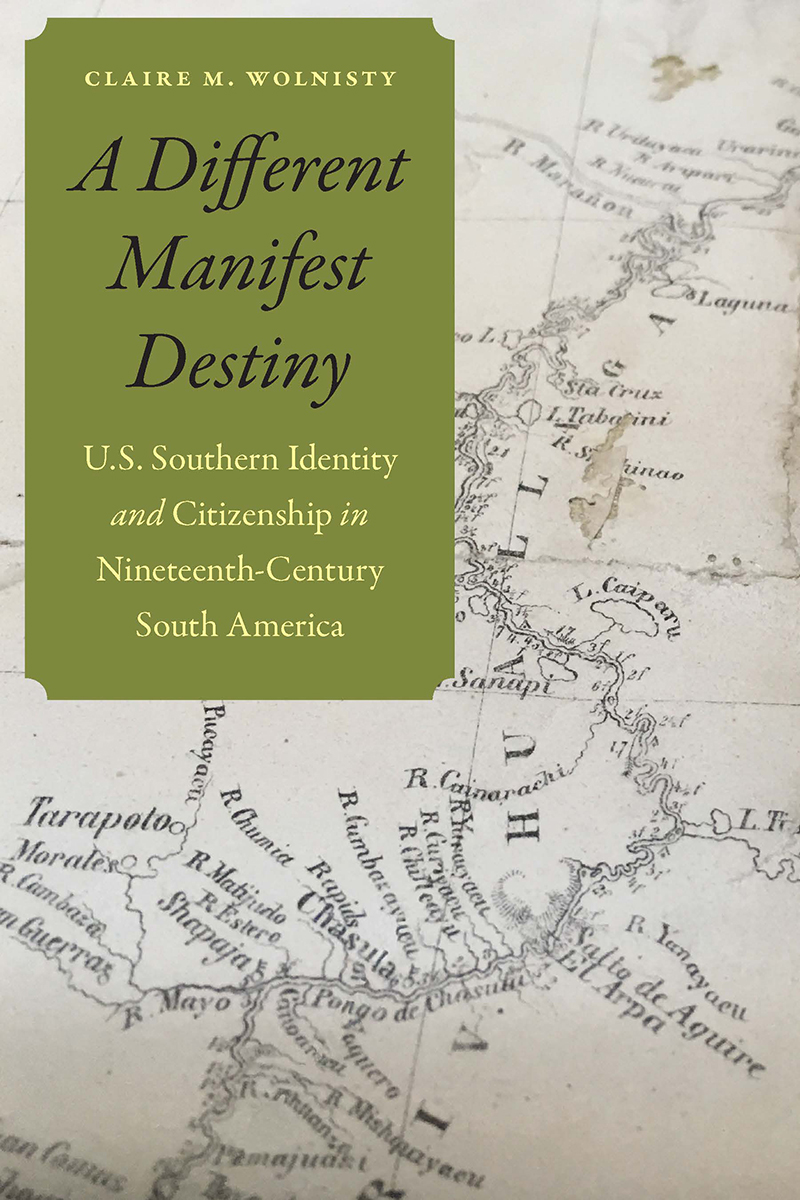 Dr. Claire M. Wolnisty, Austin College assistant professor of history, has written a new book, A Different Manifest Destiny: Southern Identity, Citizenship, and Survival in Nineteenth-Century South America. The book, available in hardback or ebook versions, was just published by the University of Nebraska Press.
Dr. Claire M. Wolnisty, Austin College assistant professor of history, has written a new book, A Different Manifest Destiny: Southern Identity, Citizenship, and Survival in Nineteenth-Century South America. The book, available in hardback or ebook versions, was just published by the University of Nebraska Press.
Wolnisty, who joined the Austin College faculty in Fall Term 2019, specializes in United States history, with research interests in 19th century transnational history, the U.S. Civil War, Texas, slavery, gender, Mexican American history, borderlands, immigration, Brazil, and colonial history. Her teaching covers a range of topics such as Confederates in the Amazon, pirates, ballet, female spies, and U.S. expansionism.
Wolnisty writes about her book, “Many of us studied Manifest Destiny in school. We know the John Gast painting, American Progress, and we know phrases such as ‘sea to shining sea’ and ‘Go West, young man.’ Students in my classrooms and many scholars in my books talk about Manifest Destiny as if it was this nineteenth-century consensus. Furthermore, Manifest Destiny in modern parlance almost always automatically signifies westward movement and the phrase misleadingly represents a singular, completed project.” She continues, “I argue in A Different Manifest Destiny that nineteenth-century, white U.S. southerners did not agree they all needed to manifest some shared destiny in the West.”
Early praise for Wolnisty’s book includes reviews from historians Laura Jarnagin Pang and Patrick J. Kelly. Jarnagin Pang writes, “Wolnisty’s brisk prose and crisp analysis refocus our concepts of Manifest Destiny southward, specifically to Nicaragua and Brazil, by systematically examining how fear, ambition, and hubris fed an expansionism in search of a future anchored in both slavery and technological advances.” Kelly reports, “Wolnisty illuminates the centrality of Latin America to the regional imagination of white southerners during the ‘long’ Civil War. Her discussion of the South’s introduction of steamships and railroads to Brazil is an important contribution to our understanding of the compatibility of chattel slavery with technological modernism.”
This fall, Wolnisty is teaching “American Colonial History and the Revolutionary War Era” and “The History of the U.S. to 1876.” In addition, she is teaching the First-Year Seminar “Travels Through Time and Space” about how travel permeates narratives humans tell about themselves. She regularly teaches “Civil War and Reconstruction,” and “Texas History,” and looks forward to continuously expanding her course offerings. At Austin College, she also is a member of the Faculty Committee for the Johnson Center for Faculty Development and Excellence in Teaching, the Gender Studies Committee, and the Center for Southwestern & Mexican Studies Committee.
Before joining the Austin College faculty, she served fall 2016 through May 2019 on the history faculty at Angelo State University and taught for several years at the University of Kansas.
Wolnisty earned her bachelor’s degree summa cum laude in history at Creighton University in Nebraska then earned her master’s degree and doctorate with honors at the University of Kansas, both focusing on United States history.
Austin College, a private national liberal arts college located north of Dallas in Sherman, Texas, has earned a reputation for excellence in academic preparation, international study, pre-professional foundations, leadership development, committed faculty, and hands-on, adventurous learning opportunities. One of 40 schools profiled in Loren Pope’s influential book Colleges That Change Lives, Austin College boasts a welcoming community that embraces diversity and individuality, with more than 50 percent of students identifying as persons of color. The residential student body of approximately 1,300 students and more than 100 expert faculty members allow a 13:1 student-faculty ratio and personalized attention. Related by covenant to the Presbyterian Church (USA), Austin College cultivates an inclusive atmosphere that supports students’ faith journeys regardless of religious tradition. The College, founded in 1849, is the oldest institution of higher education in Texas operating under original name and charter.


